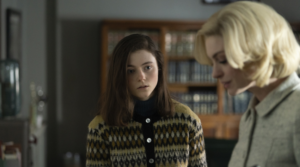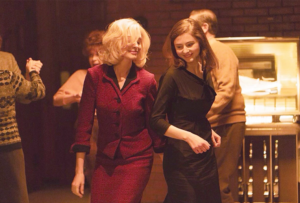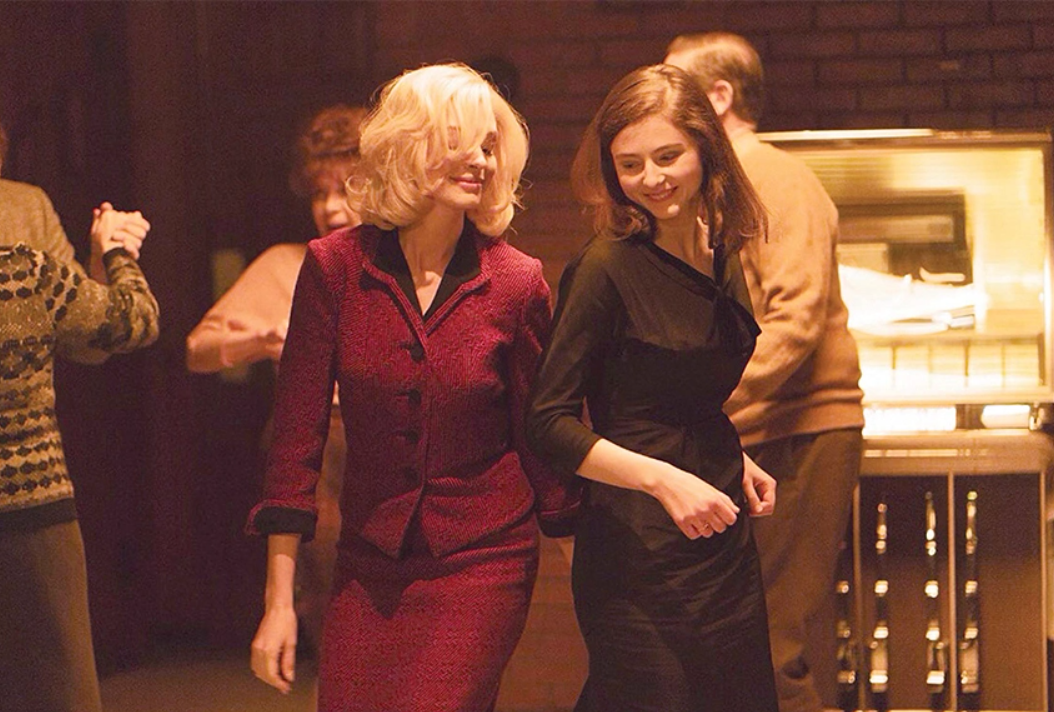Film Review
Eileen Dunlop is a blank slate. She has no life. She lives with her widowed alcoholic father, the retired police chief of the small, unnamed Massachusetts town where they live. She has a humdrum job at a local corrections facility for teenage boys. She has no propensity for meeting any young men her age – nor any real method, as this is the 1960s – long before social media and dating sites. And her shy demeanor doesn’t lend itself well to attract the attention of the very few young men who work in her facility.
Welcome to the world of “Eileen,” the debut directorial effort of William Oldroyd, adapted from the 2015 novel of the same name by Ottessa Moshfegh. Making a seamless transition from child actress, Eileen is played by Thomasin McKenzie, who was so great with Ben Foster in “Leave No Trace,” and as the Jewish “girlfriend” in “Jojo Rabbit.” In her first adult role, McKenzie performs admirably as a young lady best described as an “observer.”
When I say Eileen is a blank slate, I mean she longs for closeness and connection – so much so that she pleasures herself by watching a young couple making out in their car at night – hoping beyond all hope that the woman in that car might someday be her. But Eileen is so passive and apprehensive (as well as remote from any population center) we can’t imagine how she will ever achieve this goal. Her life is ready for anyone to come along and take control of it.
Enter Rebecca (played by Anne Hathaway), the newly hired prison psychologist. The recent Harvard grad is strikingly pretty, confident, and ostensibly without a close friend herself. She also smokes, drinks, and is not afraid to punch out a drunk who approaches her in a local tavern. In short, Rebecca is alive. Her persona encompasses everything that Eileen’s does not. Eileen is fascinated, and we believe Rebecca knows it.
Rebecca proceeds to take young Eileen under her proverbial wing, and introduce her to the riches of life – even if that includes nothing more daring than meeting for martinis after work at the neighborhood pub. To Eileen, such a meetup is so special she wears one of her late mother’s best dresses, and dons lipstick for the first time since we were introduced to her. This is a major event for hapless Eileen. Again, we are led to believe Rebecca is aware of the influence she exerts over her new friend. A potential lesbian relationship is even hinted. But what will Rebecca do with this influence? How will their friendship develop?
Unfortunately, these questions are never answered. I realize Moshfegh and her husband Luke Goebel adapted this screenplay from her own novel. But I would like to have seen the bond between the two women develop. “Eileen” sets up as a potentially fascinating character study between two women – the downtrodden observer of life, and the active participant in it. But then Moshfegh’s story hits us with a plot development or two which (a) seem out of character for Rebecca, and (b) do nothing to advance the bond between the two protagonists.
Some films are plot driven. Each new twist and turn positions us further onto the edge of our seats. “Chinatown” would be the perfect example of such an exercise in plot development. Other films are studies in character. Todd Haynes’ recent “May December” is a provocative accomplishment in the exploration of two women. Not much action occurs, but the two lead characters are spellbinding.
Not so here. The plot twists serve as a distraction from what we want. We long for an examination of two very different woman whose paths cross by circumstance. But we are “treated” to a modern-day “Sling Blade,” in which each new circumstance is designed to draw is in. Instead, these occurrences push us away. We almost can’t wait for certain scenes to end so we can return to the connection between Eileen and Rebecca.
It’s a rare day that I will call for less plot in a film, but “Eileen” stands as that exception. It simply establishes itself as a character study, and then takes the easy way out with unnecessary plot developments. It’s not a bad film; it’s just not the film you think you’re going to see. I hope Oldroyd does better with his next effort. Perhaps he could take a cue from Todd Haynes, whose body of work also includes 2015’s “Carol,” another very interesting examination of character featuring two female protagonists. Promising as it begins, “Eileen” is simply not in this category.





